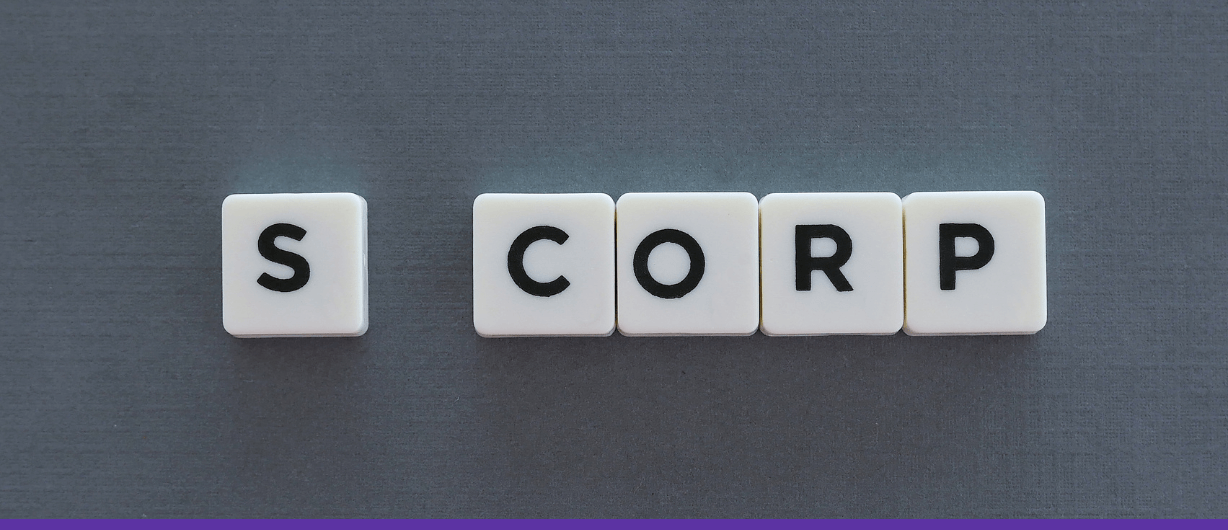September 1 2022 | By Wajiha Danish | 4 minutes Read

What is the Difference between S Corp and Partnership?
Which Method is Ideal for S Corp Bookkeeping?
What is the Most Important Bookkeeping Task for an S Corp?
How do Taxes work in S Corporation?
What is the Primary Responsibility of S Corp Bookkeeper?
Three Tips to Make S Corp Bookkeeping Simple
– Update Your Books Monthly
– Buy a Quality Bookkeeping Software
– Outsource Bookkeeping to Experts
Wrap Up
Subchapter S Corporations, also known as S Corps, are called ‘pass-through’ entities. All their profits and losses get passed to the members. Many small and medium businesses opt for S corporation status as it is more beneficial than partnerships and help business owner protect their liabilities.
In this article, we’ll explore S Corp bookkeeping and describe how the financial work varies with a change in tax status.
S Corps and Partnerships are both ’pass-through’ entities, and their ownership structure is similar. However, the main difference exists in tax treatment. An S Corp gets to divide its profits into salaries and dividends. They pay income taxes on the first, but the second counts as passive income. There are no taxes applied on passive income from the employer’s end.
Unlike this, partnerships don’t enjoy the same luxury. As their dividends count as shares of profit, each shareholder or owner has to pay self-employment tax. It is the biggest reason business owners elect the S Corp structure.
An S Corp can use either cash-based or accrual-based methods to record their finances. The selection varies with how the business makes a profit. A business selling services without an inventory can work with cash-based accounting. But, for companies delivering products and maintaining an inventory, accrual-based accounting is a better option.
For an S Corp bookkeeper, maintaining accurate balance sheets tops the list of must-dos. A balance sheet presents a complete picture of a business’s assets, ownership equity, and liabilities. These may include equipment, cash, account receivables, and intellectual property.
In addition, a bookkeeper must also calculate the ownership equity by balancing total assets with total liabilities. If assets exceed liabilities, the equity is positive. In contrast, equity is negative if the case is the opposite.
As S Corporation has several members or shareholders, the equity, positive or negative, is shared among them as per their ownership percentage.
As S Corporation has several members or shareholders, the equity, positive or negative, is shared among them as per their ownership percentage.
As S Corp profits pass directly to its shareholders, they have to pay the dividends received on their income tax, and that’s good news for S-Corps. Why?
Because they don’t have to pay payroll taxes from their end. Yet, it doesn’t mean the company has liberated itself from payroll tax. Even an S Corp has to pay payroll taxes for its employees. Only shareholders get to evade payroll tax.
For employees, bookkeeping and payroll stay the same. An accountant or bookkeeper still has to record all the essential employee data like bank details, wages, Medicare, Social Security, and income taxes.
The main responsibility of an S Corp bookkeeper is to maintain accurate records of all business transactions. Like other entities, corporations also pay state and federal taxes. Best corporations update their books monthly and reconcile them frequently so that if an entry is missing, they can recover it before it is too late.
Bookkeeping is all about tracking cash inflows and outflows. In other words, revenues and expenses. In an S Corp, the first could come from selling goods or services, rental fees, or shares from company assets.
In contrast, expenses often relate to company payroll, vendor payments, the markup on loans, interests, and taxes.
An S Corp enjoys a little slack in taxes. However, if you don’t record your transactions right, you will lose the advantage. Bookkeeping is essential to define what goes into salaries (taxable) and what counts as dividends (non-taxable). Here are three tips to make your business bookkeeping simple:
No matter the kind of business you own, you just can’t forget to balance your book at every month’s end. Why? Because if you don’t update your books monthly, you will probably forget the important details of transactions. As a result, even good books would get tough to balance.
You can’t run a business successfully without the right tools and resources. Nowadays, quality bookkeeping software is a must for every business that record loads of transaction every month.
If you are struggling with balancing your books or if the cost of managing an in-house team is becoming a burden, it is time to consider outsourcing. Outsourced bookkeeping services are not just better but also cost-effective.
See Also: How Does Outsourced Bookkeeping At Monily Work?
Bookkeeping for an S Corp is not much different from any other business type. You just need to do the basics right and your business will stay upright.
Subscribe for business tips, tax updates, financial fundamentals and more.
MORE BLOGS

In the world of small businesses, managing finances can quickly become overwhelming. Enter the bookkeeper – a financial wizard who keeps your accounts in order, ensuring […]
Learn More →
In today’s digital world, small businesses are in for a tough time when it comes to managing their finances. Traditional bookkeeping methods are a real drag […]
Learn More →
The emergence of AI has impacted a number of sectors, including bookkeeping. AI bookkeeping solutions have been growing in popularity among small firms in recent years […]
Learn More →